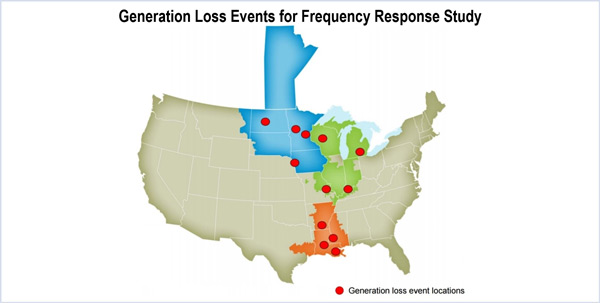By Amanda Durish Cook
CARMEL, Ind. — MISO is beginning a study to assess its frequency response performance and identify needed improvements.
In the first half of 2017, MISO will compile system data from major generation loss events for evaluation. The RTO’s initial sample of generation loss events are spread evenly across the footprint, although it said data may not be available for some locations.
MISO’s frequency response continues to “decline year after year” and while not a pressing problem yet, it is “concerning,” Durgesh Manjure, MISO resource adequacy manager, said at an April 6 Reliability Subcommittee (RSC) meeting.
In January, the RTO’s staff asked for stakeholder input on how to address the declining frequency response capability, presenting preliminary simulations showing the system recovering too quickly when compared with real events — an indication of the need to fix governor parameters, officials said. (See MISO Aims for Improved Frequency Response Modeling.)
In the latter half of 2017, MISO will run simulations based on collected data and compare results to the actual events. By early 2018, the RTO will use stakeholder input to refine the study models.
Although MISO originally planned to use data from its SCADA system, it now says those measurements “seem inadequate for model validation” because the data are not detailed enough and not synchronized across locations, creating a potential time lag.
Data collected from phasor measurement units (PMUs) might be the better option, because their measurements are detailed and synchronized in real time across the grid, the RTO said.
However, Manjure said PMU data may not be available for all of the large generating units. In addition, PMU data is deleted after one year. It “remains to be seen how useful” the PMU data will be, Manjure said.
“Just being able to leverage the PMU data is a work stream in itself,” Manjure said. “We’re not quite sure which things are going to work … as we start peeling the onion.”
RSC Chair Tony Jankowski said he preferred MISO get the most detailed data to begin improving modeling.
Manjure said MISO would present more information on the study at the June RSC meeting.





